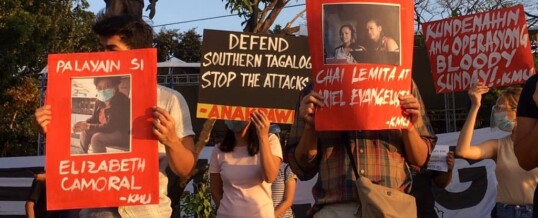
McLeod Group blog by Em Mijares and Kirsten Van Houten, March 29, 2021
On March 7, 2021, police and military in the Philippines killed nine human rights defenders and arrested six more in what human rights groups have dubbed “Bloody Sunday”. Community organizers Melvin Dasigao, Mark Lee Coros Bacasno, farmers Abner Damas Esto, Edward Damas Esto from Rodriguez, Rizal; Dumagat community leaders Puroy Berhemedo dela Cruz and Randy Berhemedo dela Cruz from Tanay, Rizal; activist couple Ariel Evangelista and Chai Lemita-Evangelista from Nasugbu, Batangas; and BAYAN-Cavite Coordinator Manny Asuncion were all killed in the massacre. The latter was murdered inside the office of the Workers Assistance Center (WAC) in Dasmariñas, Cavite.
While Canada remained silent, the Office of the United Nations High Commissioner for Human Rights (OHCHR) has expressed shock and deep concern over the “arbitrary killings”. Amid a seeming renewal in Canada-Philippines relations, the Canadian government has an obligation to denounce the Bloody Sunday attacks and the worsening human rights situation in the Philippines. It should also include robust human rights provisions in any trade agreement with the Association of Southeast Asian Nations (ASEAN) or the Philippines.
Canadian civil society organizations are calling on the government of Canada to fully implement its Voices at Risk guidelines, which promise to protect human rights defenders, and to condemn these attacks. However, a recent article in the Hill Times suggests that more may be at stake for the Canadian government. Canada is in the process of negotiating a multilateral free trade agreement with ASEAN members, including the Philippines.
Bloody Sunday took place in the context of increased efforts by the government of the Philippines to restrict space for civil society. Two days prior to the Bloody Sunday attacks, President Rodrigo Duterte ordered police and military police to “kill” and “finish off” communist rebels and not to “mind human rights”. Presidential spokesperson Harry Roque justified the killings, claiming that “Under International Humanitarian Law, the President’s order was correct. Kill, kill, kill because if there’s a fight and your enemy is armed and can kill you, you wouldn’t wait to be killed, right?”.
National Task Force to End Local Communist Armed Conflict (NTF-ELCAC) Vice Chair and National Security Adviser Hermogenes Esperon also confirmed that President Duterte issued a shoot-to-kill order against communists and stated that it was warranted. The OHCHR noted that the execution of shoot-to-kill orders and search warrants has resulted in killings in previous occasions, such as the Tumandok massacre of December 2020, in which nine Indigenous people were killed.
State forces blocked the families of those killed from accessing their bodies and detained the paralegals and activists assisting the families. These attacks are believed to be facilitated by the practice of red-tagging, used by the Duterte government to target human rights defenders by accusing individuals and groups of supporting the violent communist rebellion being carried out by the New People’s Army.
In November 2020, Canada received a new ambassador from the Philippines. A profile in the Hill Times suggests that Rodolfo Robles believes that Canadian-Philippines relations are strong, despite strife over a wayward shipment of unwanted Canadian garbage turned away from the Philippines in 2019 and a spat between President Duterte and Prime Minister Justin Trudeau over human rights at an ASEAN meeting in 2017. The article also suggests that the Philippines would welcome improved trade relations facilitated by the multilateral free trade agreement being negotiated between Canada and the ASEAN, or through a possible bilateral agreement.
In addition to denouncing this massacre, the government of Canada, and the Canadian Embassy to the Philippines in particular, should immediately take action to support and protect human rights defenders in the Philippines under Voices at Risk: Canada’s Guidelines on Supporting Human Rights Defenders. Further, human rights organizations in the Philippines are calling on Canada and other countries to support the UN Human Rights Council’s efforts to conduct an independent investigation on the situation in the Philippines. The government of Canada must also ensure that any new trade agreements with the Philippines include robust and enforceable human rights provisions.
Em Mijares is the Project Coordinator of the Ecumenical Voice for Human Rights and Peace in the Philippines (EcuVoice) human rights and gender rights project. Kirsten Van Houten is a Contract Instructor at the Norman Paterson School of International Affairs, the Global Coordinator of the COVID and Mining Nexus Project, and the former co-convenor of Cooperation Canada’s Philippines Sub-Group. Photo: Karapatan.
